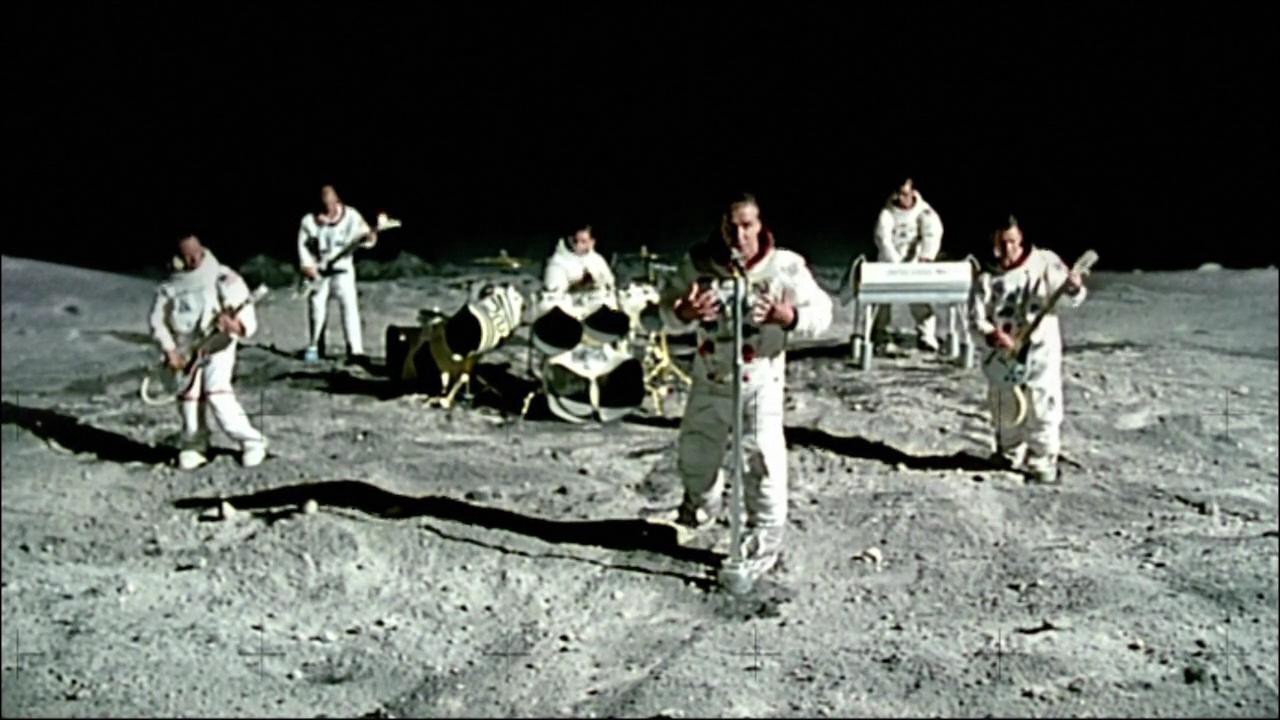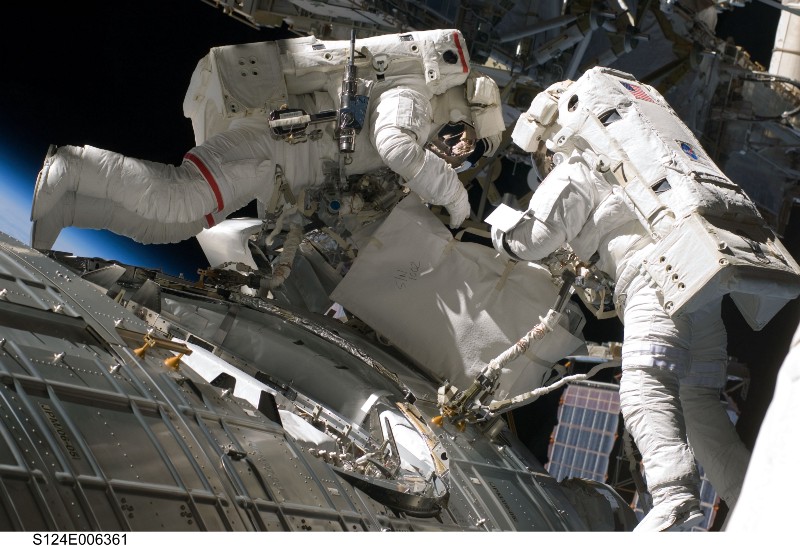Ask Ethan # 77: People in a Space Vacuum
Will you explode, freeze or boil? Tips for extending life in a vacuum.

Rammstein, 2004. Sorry, could not resist!
Vacuum is much better than the hell, which nature replaces it.
- Tennessee Williams
On Earth, we take a lot of things for granted, and one of them is our atmosphere. It not only provides us with the necessary oxygen for survival, but also extends upwards by about 100 km, held by the gravity of the Earth, providing 100,000 Pascal of pressure on our bodies. In addition, it provides heat exchange by a huge number of collisions of air molecules and molecules of our bodies.
')

What happens if all this disappears? This week I received a large number of your questions, and one of them was the question of Kerry Pinckney, who wants to know:
Will a man explode in a vacuum? I believe that in a vacuum, the water boils and then freezes, others say something in the style of "tried on a dog, and it survived." In the movie Gravity, the dude raised his helmet and instantly froze ... How does it work, Ethan?
There are many opportunities, and they are all justified.

Maybe you will explode like Richard Branson when Mike Tyson shoots his helmet on the series Mike Tyson Mysteries, in the episode "Heavyweight Champion of the Moon". The logic here is similar to Kerry's intuition: with a drop in pressure, we know that water in space will boil (and then freeze), and perhaps the fact that the body is 70% water will lead to death from an explosion.

There is another option from the x / f "Remember All": perhaps a pressure drop from the outside - together with the normal pressure inside - will cause your insides to be pushed out?


Or, perhaps, as in the aforementioned “Gravity” or “Mission to Mars”, you will instantly freeze, because because of the vacuum, your outer layers will be frozen, and the cold will penetrate into the depths of your body?
Is it even possible that other physical laws that are not sufficiently illuminated in entertainment programs work? The influence of the cosmic vacuum - especially the rapid transition from a medium with normal pressure to an almost absolute vacuum - will be very different from our usual sensations on Earth. Let's find out what science says about it!


The first thing to consider is that the lungs are like a ball, and recall one of the simplest laws of chemistry: Boyle's law is Mariotte. He says that all things being equal (temperature and mass), as the pressure drops in the system, its volume rises. If the pressure drops twice, the volume doubles; if it falls ten times, the volume increases ten times.
Therefore, if you have air in your lungs and you reduce the external pressure, say, a trillion times, the volume of your lungs will try to increase a trillion times. This is very bad! If you go from the usual pressure to the vacuum in less than 0.5 seconds, the air does not have enough time to smoothly leave the lungs. It will look like a bomb exploded in your lungs - explosive decompression. The risk of lung injury is very high and death will be quick and painful. For the observer, it will not be spectacular, but for the person experiencing it - catastrophic.
Suppose that you underwent decompression of the lungs slowly — for example, you breathed out during depressurization — or you were lucky and the injury was not fatal. What is to be feared further?
It is possible that, like a meteorological probe rising too high (and experiencing very low pressure from the outside), the body will not be able to withstand the vacuum of space. But, although you may suffer from tissue breaks, if you move too quickly from high pressures — such as underwater — to a vacuum, in the event of a drop in pressure on just one atmosphere, nothing will happen except small swellings. So the options "Richard Branson" or "Recall All" do not threaten you. Human skin is much stronger than a meteorological ball.



Regarding other options - although, in the end, you will freeze, it will take a lot of time. Things on Earth freeze quickly if brought into contact with any environment. In the vacuum of space, the body can only get rid of heat through radiation. At the same time, you are actively warming up your body from the inside. In water with a temperature of 22 ° C below your body, you will freeze to death much faster than in cosmic vacuum!
Therefore, Kerry, and your friends, and movies - all wrong. If your lungs do not tear from decompression, what will you die from? This is very unpleasant, and after receiving the present description you will understand why spacewalks are always done in pairs.

Without oxygen (or whatever) in the lungs - and you need it for survival - the human body very quickly begins to suffer from hypoxia. Without proper access of oxygen to the tissues, you will have from 10 to 14 seconds before losing consciousness. You will have the energy to work the muscles and perform some tasks, but this is usually not enough to restore the air supply and to move to the environment provided by pressure and oxygen.
Your body will begin to expand at this time, but a more serious symptom will be the cessation of circulation, which occurs approximately 30 seconds after decompression, and peripheral paralysis, in which muscles lose their ability to contract. From this point on, you still have 60 seconds left for someone to drag your body on Wednesday with oxygen and normal pressure. If this happens, all the symptoms will remain reversible, and if not, cell damage and death will be inevitable.
Oddly enough, the very first film where this problem was covered, Kubrick’s Space Odyssey 2001, came closer to the reality of the others, showing the death of Frank Poole.
In real life, there was only one case where space explorers died in this way, during an incident with the Union-11 in 1971. As a result, three Soviet cosmonauts died: Georgy Dobrovolsky, Vladislav Volkov, Viktor Patsayev.

If your body is found, it will be soft, flabby, roughly doubled and blue. A few hours later, it was also frozen.
There is a possibility of recovery after a longer exposure to vacuum. An interval of 90 seconds always worked with dogs, swelling and temporary blindness passed, and the ability to walk returned after 10-15 minutes. Dogs exposed to vacuum for 120 seconds almost always died. Chimpanzees in experiments of 1965-1967 could survive in a vacuum for up to 210 seconds, although one brain suffered irreversibly after one 3 minutes and another had a heart attack.
In 1965, a technician at the Lyndon Johnson Space Center accidentally underwent decompression. This case is described in Scientific American magazine:
A technician in a vacuum chamber at the Lyndon Johnson Space Center accidentally decompressed his spacesuit, damaging the hose. After 12-15 seconds, he lost consciousness, and then came to his senses after 27 seconds, after the pressure had recovered to half the atmosphere. He reported that the last memory before he blacked out was the boiling of saliva on the tongue and the loss of the sense of taste that remained with him for four days after the incident. For the rest, he was not injured.
In such a situation it is very scary to be, and the key moment for you is to exhale all the air and spend the last 10 seconds in consciousness, assuming such a position that you could be saved. If you get to quickly enough and restore pressure, you can survive. Otherwise, oxygen starvation will take its toll and, in a manner similar to carbon monoxide poisoning, death will come to you quickly.
Thank you for the wonderful question, and I hope that the explanation has been made clear for you and for the rest. Send me your questions and suggestions for the following articles.
Source: https://habr.com/ru/post/396413/
All Articles